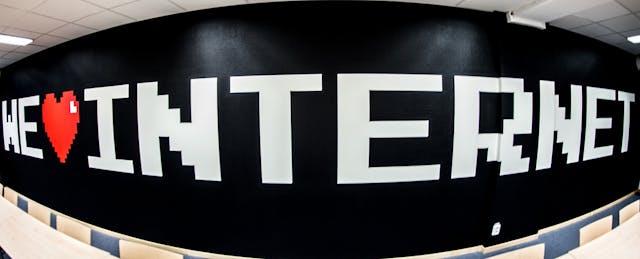“I urge the FCC not to play policy roulette with the lifeblood of entrepreneurship in this country.” So ends a blog post from General Assembly co-founder and CEO, Jake Schwartz, urging the Federal Communications Commission to rethink proposed changes to net neutrality rules.
Schwartz is joined by several other leading education entrepreneurs from Codecademy, TeachBoost, CodeCombat and Open Curriculum who also recently filed concerns about how having a “two-tiered” Internet can stifle innovation. (Each company’s filings are linked.) In May, over 100 Internet companies--including industry giants like Google and Facebook, which presumably would be able to afford the “fast lane” access--signed a letter to the FCC in protest of paid prioritization.
Some background on the net neutrality debate: Internet service providers are legally responsible for treating all content equally, meaning World of Warcraft and world history lessons from Khan Academy should be delivered to consumers at the same speeds. But in May 2014, the FCC proposed new rules that would allow Internet service providers (ISPs) to provide faster Internet speed to content providers willing to pay more--a policy known as paid prioritization or content discrimination, depending on whom you ask. Opponents worry this would introduce a formidable barrier to entry for startups looking to compete with established market players.
Andrew Gioia, co-founder and COO of TeachBoost, believes the proposed rules “would open the door for commercially reasonable discrimination by ISPs.” A larger company who could afford a partnership with Internet service providers would be able to bring its content to consumers much more quickly. The changes would place “a very real stifle on startups,” as companies with less funding, unable to purchase the faster access to their sites, would be at a “competitive disadvantage.”
Supporters of the proposed rules see increased speed of content delivery as a service that should be available to consumers, and to companies willing to pay for them. If ISPs can provide better quality of service to customers who pay for it, they should be able to, and the government shouldn’t prevent suppliers from offering it. “You can see a free market argument from both sides,” Gioia cedes. From the viewpoint of ISPs, he explains, “if [the government] wants to open up the market, let us charge market rate to those who are willing to pay for it.”
One major concern is how the proposed rules can radically raise barriers to market entry by forcing startups, many with minimal funds, to “pay to play.” In his letter, Varun Arora, CEO of Open Curriculum, shared the story of how he started his first Internet company at twelve years old in Oman, enabled by affordable access to dial-up and “the powerful democratic nature of the medium called the Internet.” When he founded Open Curriculum, well-established competitors “could have crush [sic] our increasing popularity any day given a preference or advantage on the only medium for us to reach and serve out [sic] customers--the Internet.” Other letters echoed this concern.
If edtech startups can’t afford to pay for access, the end users--students and teachers--may end up paying a different kind of price. In an interview with Campus Technology, Michael Berman, vice president of Technology & Communication for California State University Channel Islands, said:
"It's not hard to imagine, for example, a commercial network that has Apple as a major sponsor and makes it harder to use an Android phone or vice-versa. Or, a network where the video for courses from the University of Phoenix or Coursera run quickly, but those from edX and your local community college run at slower speed and lower resolution."
Opponents of the FCC proposal see it as a strike to the innovations that define how we think of the Internet. “In practice, it ends up stifling the free market for startups and small companies,” Gioia explains. “That’s not the kind of open, free Internet that we grew up on. And it’s not what we want to continue to see.”


